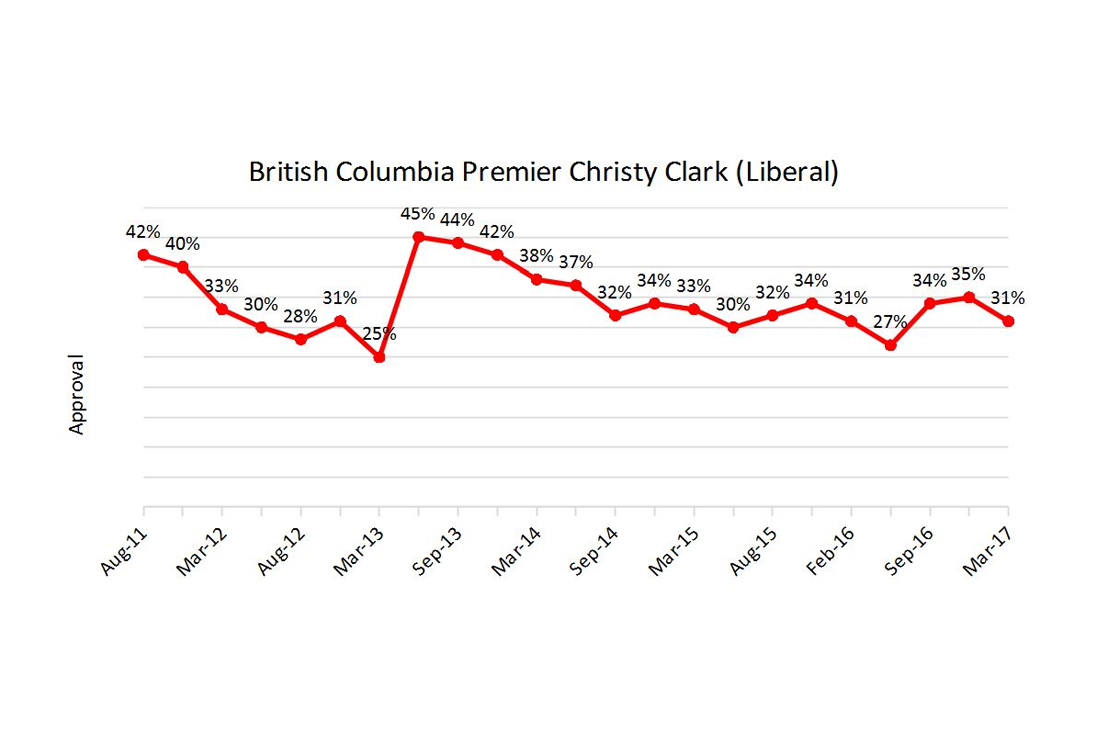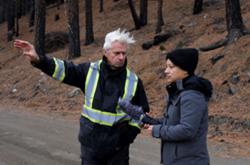More than 60 per cent of British Columbians disapprove of the job Premier Christy Clark is doing — but an equal number believe the parties seeking to replace her have no plan for the province, a new public opinion poll has found.
Clark’s approval rating dropped to 31 per cent in an Angus Reid Institute poll that found twice as many people — 62 per cent — disapprove of the job she’s doing. Few were unsure of their opinion on the premier.
“Clearly a lot of people don’t approve of her,” said Shachi Kurl, executive director of the Angus Reid Institute.
They may still vote for her though, Kurl said, noting that Clark’s approval rating was even lower at 25 per cent a few months ahead of the 2013 election.
In other bad news for Clark, another poll the institute released Friday found 76 per cent of respondents agreed with the statement that the BC Liberal Party “is only interested in helping its political donors and big business.”
At the same time, the number of people naming the economy as their top issue dropped by 12 per cent from a year ago, with housing and health care emerging as concerns. Just 14 per cent said the economy was the most important issue, compared with 21 per cent who said it was housing and 19 per cent who said health care.
Clark and the Liberals had a slight edge as best to manage the economy, but NDP leader John Horgan and his party were seen as better on health care and housing. Green Party leader Andrew Weaver was seen as best on the environment.
More than half of those surveyed said investing in public services, including health care and education, was their top priority, putting spending ahead of tax cuts, promoting jobs or balancing the province’s budget.
“Also working against the government on the economic file is the widespread sense that inequality in the province is growing,” the pollster’s report on the survey said. Three-quarters said growing inequality is a “huge problem” for the province. Almost half disagreed with the statement that all a person needs to do to find success in B.C. is work hard.
But the sense of unease does not necessarily translate to support for the other parties running against the Liberals in the May 9 election, Kurl said.
The survey found 42 per cent of British Columbians approve of Horgan’s performance and 35 per cent disapproved. Twenty-three per cent were unsure.
For Weaver, the approval rating was 36 per cent, disapproval 22 per cent and 42 per cent said they were unsure.
Kurl said it’s significant that the poll found 62 per cent don’t believe either opposition party has a real plan to help British Columbians. “That is something that jumps out for me,” she said. “That may ultimately be the trump card for the BC Liberals.”
While the other parties may press Clark on the high number of people who feel left behind or squeezed in the economy, Kurl said, “I can see the premier saying, ‘I’m not perfect, but at least people don’t believe I don't have a plan.’”
If the opposition parties have plans, they need to do a better job communicating them to the public. If they don’t have plans, they need to create them quickly, she said.
Kurl said the firm deliberately didn’t ask who people would vote for. While there tends to be interest in those numbers, she said, “They don't always give us a sense of what are the issues that are driving the horse race numbers. You need to dig deeper.”
The approval rating survey was conducted online between March 6 and 13 and included 5,404 adults across Canada.
The B.C. election issues poll included a randomized online sample of 604 British Columbian adults surveyed between March 6 and 13. Similar surveys have a margin of error of plus or minus four per cent, 19 times out of 20. ![]()
Read more: BC Election 2017, BC Politics


















Tyee Commenting Guidelines
Comments that violate guidelines risk being deleted, and violations may result in a temporary or permanent user ban. Maintain the spirit of good conversation to stay in the discussion.
*Please note The Tyee is not a forum for spreading misinformation about COVID-19, denying its existence or minimizing its risk to public health.
Do:
Do not: